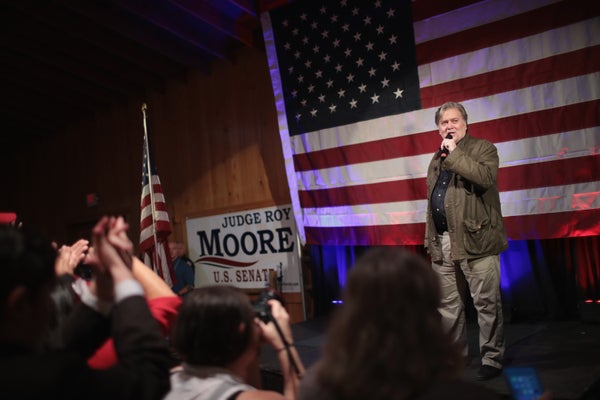This article was published in Scientific American’s former blog network and reflects the views of the author, not necessarily those of Scientific American
Roy Moore, the Republican nominee for an upcoming Alabama special Senate election, calledThe Washington Post “fake news” earlier this month after the newspaper published a thorough investigation of alleged sexual encounters between Moore and multiple teenage girls. Moore’s attacks on the highly reputable newspaper are part of a broader pattern in which prominent public figures, including Pres. Donald Trump (who yesterday discounted the claims about Moore), recently have used the label of “fake news” to denounce quality investigative journalism. Such attacks pose an urgent and systemic danger to our democracy because they undermine credible media reporting on such behavior, thereby loosening controls on corruption and on the abuse of power.
When considering politically charged reports such as the Moore scandal, our minds tend to search for and interpret new information in ways that conform to our past beliefs, rather than updating previously held beliefs in light of new evidence. This irrational thinking pattern is known as confirmation bias, a term coined by psychologist Peter Wason. Similarly, evolutionary psychologists, including Rick Shenkman in Political Animals: How Our Stone-Age Brain Gets in the Way of Smart Politics, have shown that we tend to favor tribal identity over truth when assessing politicians’ claims. We also tend to favor our intuition instead of rational, intentional thinking, a phenomenon explored by scholars such as Daniel Kahneman.
One way to overcome these mental patterns is to solicit the opinions of people who have access to large bodies of information as well as a political motive to support one side of a dispute, but who refrain from doing so or even support the other side. Indeed, a number of prominent GOP leaders, including Senate Majority Leader Mitch McConnell and House Speaker Paul Ryan have called on Moore to withdraw from the Senate race.
On supporting science journalism
If you're enjoying this article, consider supporting our award-winning journalism by subscribing. By purchasing a subscription you are helping to ensure the future of impactful stories about the discoveries and ideas shaping our world today.
Some Republicans, however, who are well known for describing mainstream media outlets as “fake news” supported Moore’s attack on The Post and continue to defend him. Former Trump adviser and Breitbart Executive Chairman Stephen Bannon accusedthe Post of being “purely part of the apparatus of the Democratic Party” for conducting its investigation. Prominent Virginia Republican Corey Stewart, who lost a gubernatorial race there earlier this month, also refused to criticize Moore and instead attacked the newspaper.
To understand the danger of such rhetoric, let’s consider how our democracy functions. In Media and Democracy communications scholar James Curran highlights the critical role of a free and independent media in maintaining the political health of a democratic society, specifically by addressing corruption. Research by Lindita Camaj of the University of Houston shows high levels of media freedom correlate with low levels of corruption, and vice versa. Other studies reveal the growth of authoritarianism in a country is typically associated with attacks on the media.
This scholarly context provides major grounds for concern about Moore’s attack on the Post as well as the support he has received from some extremist Republicans. Even more worrisome: Moore’s attack on quality investigative reporting is part of the trend that gained momentum especially during the early part of the 2016 presidential race, in which several politicians adopted the tactic of condemning as “fake news” any journalism unfavorable to them.
New Jersey Gov. Chris Christie (R) used this approach this summer. He had ordered a number of state-run beaches in New Jersey closed on June 30, and then spent time with his family on July 2 at a closed state beach. Reporters for the state’s largest newspaper, The Star-Ledger, photographed him and his family at the beach but Christie denied the situation until he was confronted with the photographic proof. Still, he did not acknowledge the transgression and never apologized for the lie and abuse of power. Instead, he attacked The Star-Ledger for its reporting.
If he had not attacked the media, the investigation of Christie might simply represented a sordid example of an abuse of power. Our democracy would have operated more or less as conceived, with voters receiving relevant information from a credible source. Instead, Christie’s attack distracted attention from the abuse of power, and he presented himself as a fighter against purported media bias.
In recent months the media have reported on a parade of politicians, including former National Security Adviser Michael Flynn and Kentucky Gov. Matt Bevin, alleged or known to have participated in abusive or corrupt behavior who have gone on to deploy anti-media rhetoric in attempts to shield themselves from negative public opinion and to enable their continued activity. All of us—regardless of our party affiliation—will be greatly harmed if politicians continue to get away with corruption and abuse of power by slapping a “fake news” label on credible media sources. As the research cited above shows, if politicians’ attacks on the media result in increased restrictions on media freedom, we risk the triumph of corruption and authoritarianism in the U.S., in federal and in local politics. Attacks on the media currently pose an existential and systemic threat to our democracy, and we must do everything possible to promote truth and protect quality journalism.
